No CrossRef data available.
Article contents
What Do We Know that Varèse Didn’t?
Published online by Cambridge University Press: 05 March 2015
Abstract
This article reflects on significant technological, musical and cultural processes that took place since Varèse envisioned the concept of organised sound: understanding these processes may provide a strategic vantage point from which to gain insight into our evolving attitude to modern aesthetic and technological development and thus formulate informed strategic decisions concerning our relationship with the latter. The discussion begins by focusing on technological processes, including accelerated change, cycles of enhancement, obsolescence, retrieval and reversal, and the non-neutrality of technology. This is followed by a focus on musical issues resulting from the decoupling of sound control from sound production, interactivity, the expansion towards time-based media and the possible active role of audiences in the realisation of music. Discussion is then posited within the wider cultural context of modernism and the postmodern era, the eroding popular/art divide and the obsolescence of music as a cultural artefact resulting from technological change. This leads to the conclusion, which identifies tentative learning outcomes that may be helpful in formulating future strategic decisions.
- Type
- Articles
- Information
- Organised Sound , Volume 20 , Issue 1: Special issue: Organised Sound Celebrates 20 Years , April 2015 , pp. 23 - 29
- Copyright
- © Cambridge University Press 2015


